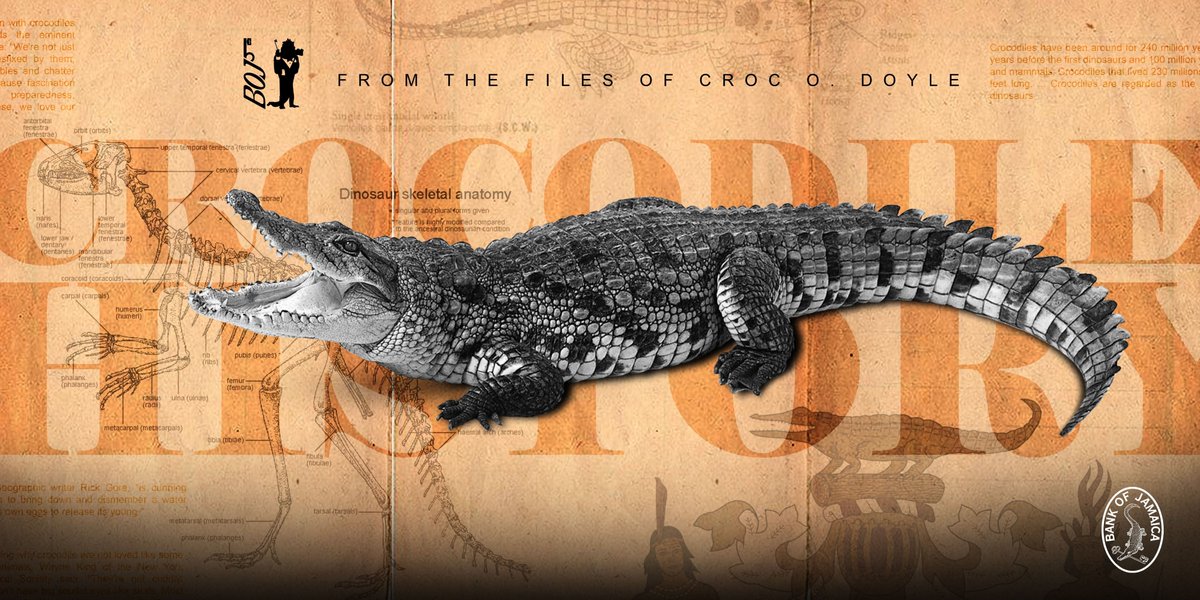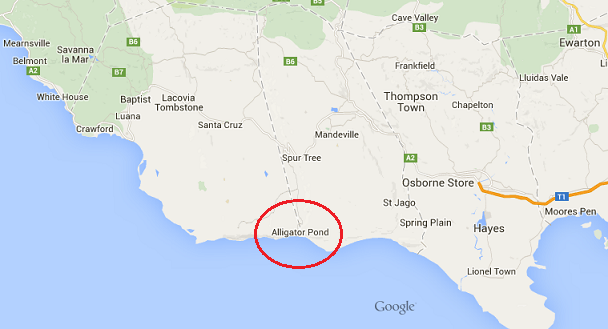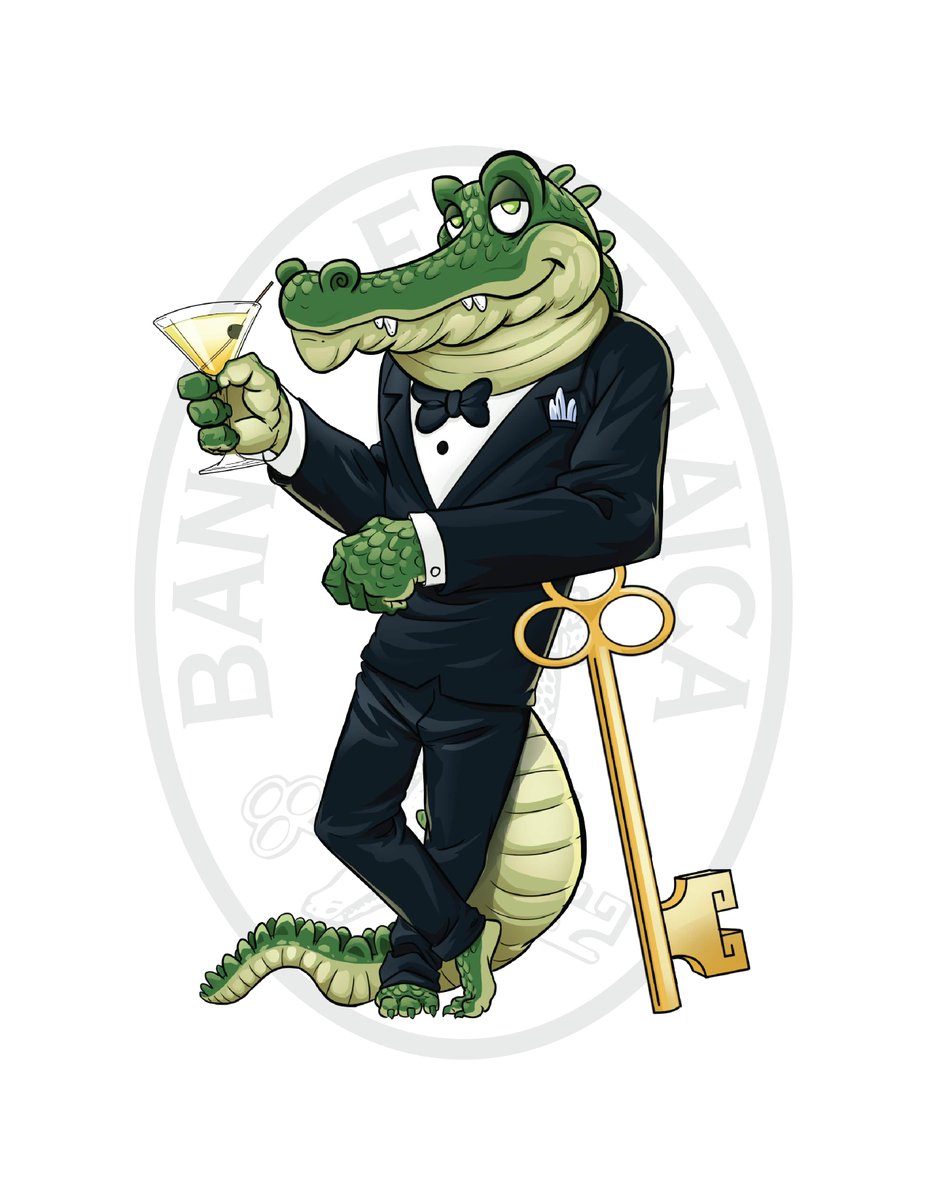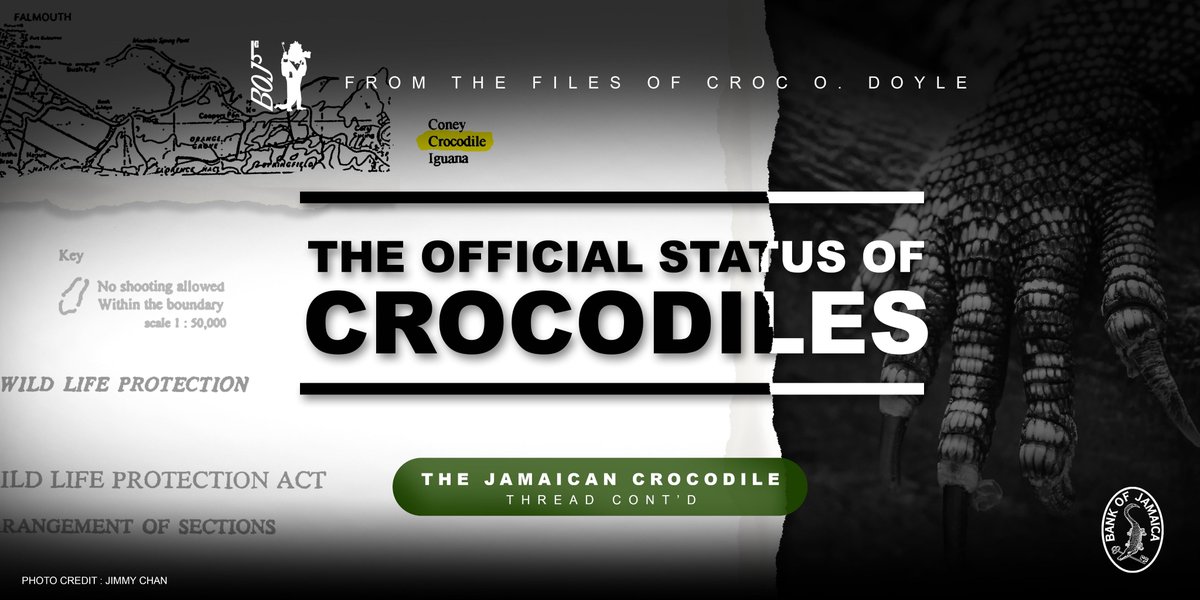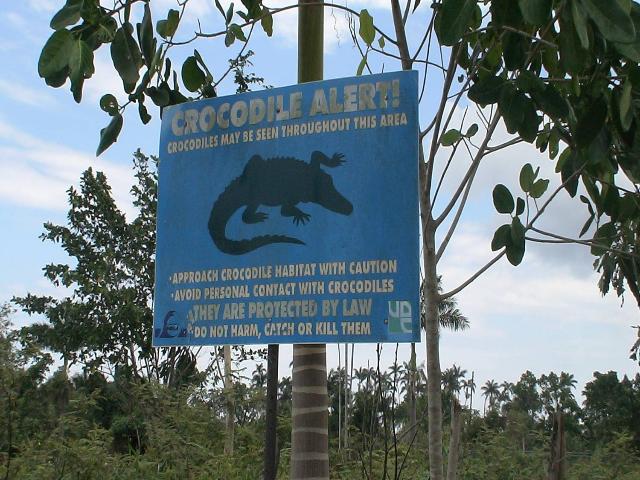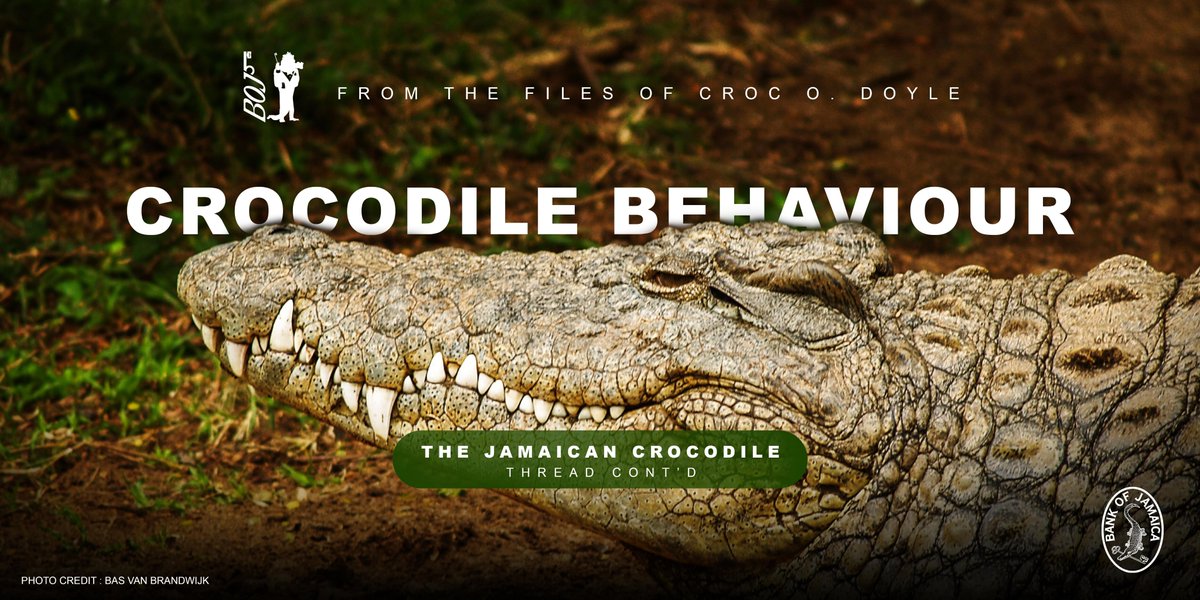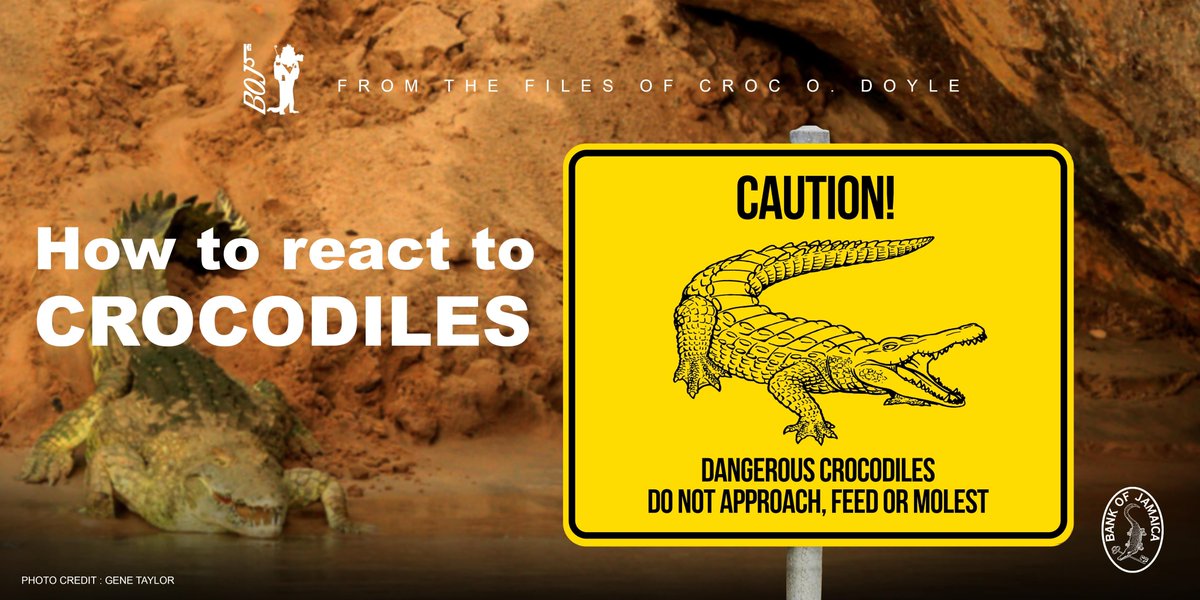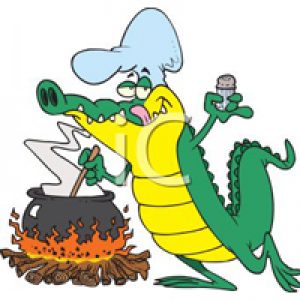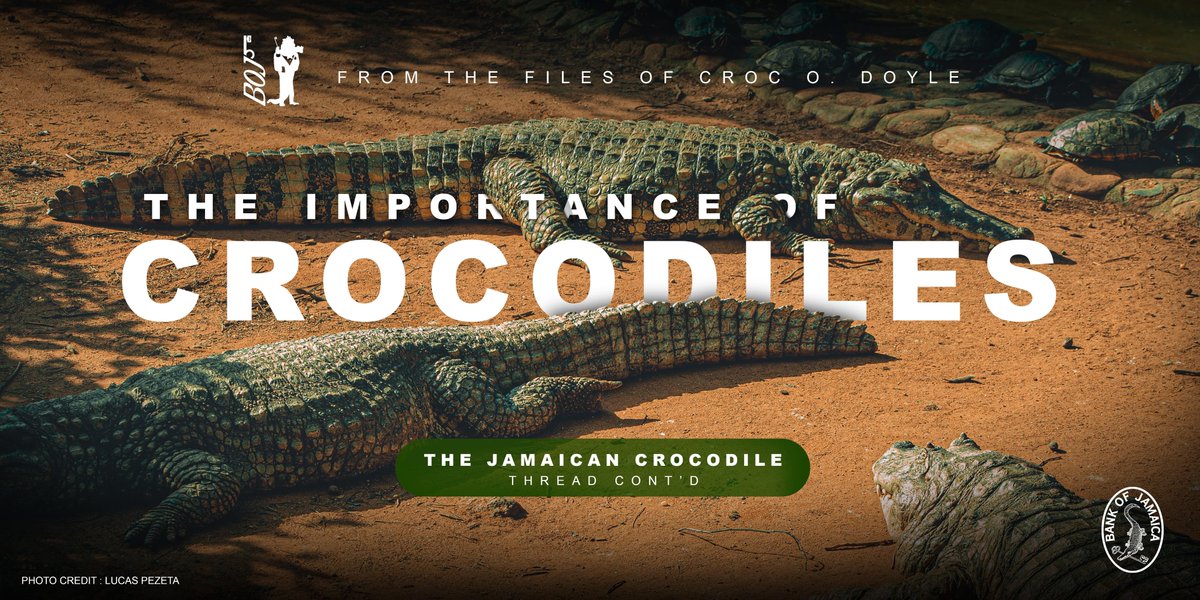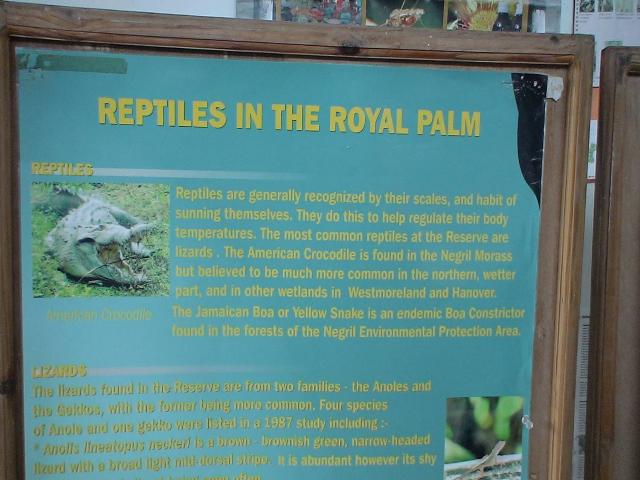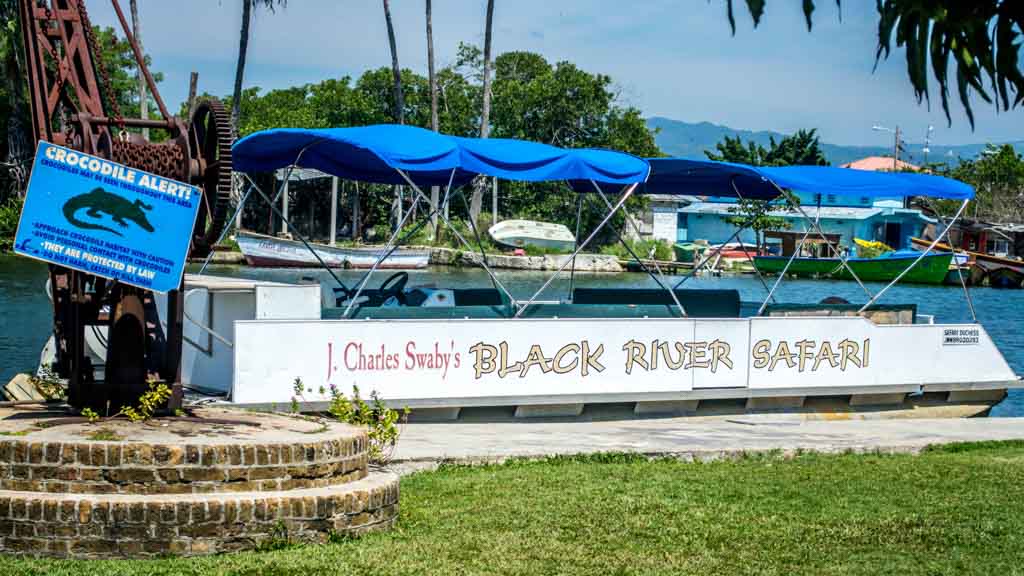With crocodiles in the news of late, it& #39;s a good time to be reminded that while Agent Croc O. Doyle is a rare individual, office job and all, other crocodiles aren& #39;t as sophisticated.  https://abs.twimg.com/emoji/v2/... draggable="false" alt="🤓" title="Nerd face" aria-label="Emoji: Nerd face"> Regular Jamaican crocodiles do, however, enjoy special status in several ways. #BOJSpeaks
https://abs.twimg.com/emoji/v2/... draggable="false" alt="🤓" title="Nerd face" aria-label="Emoji: Nerd face"> Regular Jamaican crocodiles do, however, enjoy special status in several ways. #BOJSpeaks  https://abs.twimg.com/emoji/v2/... draggable="false" alt="🧵" title="Thread" aria-label="Emoji: Thread">
https://abs.twimg.com/emoji/v2/... draggable="false" alt="🧵" title="Thread" aria-label="Emoji: Thread">
2. DNA tells us that crocodiles are among the world& #39;s oldest living creatures and provide a rare link to the planet& #39;s past, since they coexisted with dinosaurs. The crocodile perhaps survived this long because it has no natural predators and hence sits atop the food chain...
3. Closer to home, the indigenous crocodile is, of course, highlighted in BOJ& #39;s logo, from which evolved agent Croc O. Doyle...
4...It also sits proudly atop Jamaica& #39;s Coat of Arms. The Coat of Arms and BOJ both pre-date Jamaica& #39;s independence. BOJ began operations in 1961 after creation by law in 1960. In February 1961, Jamaica became the first British colony to receive our own Coat of Arms...
5. Twenty-one species of crocodiles inhabit global tropic and subtropical regions, but Jamaica is only known for one, the American Crocodile (Crocodylus acutus). The name doesn& #39;t refer to the USA, but rather to the fact that crocodiles are indigenous to the entire Americas...
6. Despite a famous place named Alligator Pond and several folk-tale references ("...Man who nuh dun cross rivah nuffi cuss alligator sey him mout& #39; long...”) using the names interchangeably, crocodiles are different from alligators and alligators are not native to Jamaica...
7...The major visible difference between both is facial appearance. The alligator has a short head with a blunt, flat snout, while the crocodile has a long, more elegantly tapered snout. Now you know why Croc O. Doyle is so cute!
8. Since 1971, Jamaican crocodiles have been protected by the Wildlife Protection Act. This is because, despite surviving dinosaurs, crocodiles are now an endangered species globally. The Jamaican crocodile population is threatened by the encroachment of...
9...clearing land for construction, destruction of wetlands, plus hunting and killing. It& #39;s illegal to hunt, harass, capture or kill any crocodile or possess a whole or any part of a crocodile, barring special permission from @nepajamaica. Offenders can be fined or imprisoned.
10. You might be relieved to know that Jamaican crocodiles are naturally shy and reclusive and prefer being left alone. In the wild, they will usually submerge or retreat at the slightest disturbance. Like most animals, crocodiles are more aggressive during breeding season...
11...and will attack to defend their nest or if they feel threatened or cornered with no retreat. Most cases of humans being attacked occur when humans initiate or encourage contact. Crocodiles, in Cuba, Asia, Australia, and Africa are more aggressive than the Jamaican variety.
12...If you are not invading their space, it is the natural behaviour of crocodiles to turn away from humans. THIS IS WHY WE SHOULD NEVER FEED THEM, because teaching them to approach you for food or see you as a source of food (which is not a stretch from seeing you AS food)...
13...changes their behaviour and makes them more likely to approach humans instead of turning away. Leave them alone and they will leave you alone.
14. Regard crocodiles with as much respect as fear. Remain calm and retreat if you see one. Stay clear of rivers and swamps known for crocodiles in the breeding season of March to August, especially at night. Do not dump garbage or other refuse in rivers, swamps or on beaches...
15...as this will attract them. For the same reason, do not tether small animals like sheep, goats or pigs close to rivers or swamps known for crocodiles. if you encounter a crocodile in a populated area, stay away from it and call @nepajamaica or @JamaicaConstab.
16. Crocodiles usually live in quiet, remote, wetland areas, preferably with a good supply of food and brackish water. Although they are mostly found all along Jamaica& #39;s south coast, from Westmoreland to St. Thomas, smaller populations can be found in Hanover and Trelawny.
17. Crocodiles are carnivorous (meat-eaters) and will eat a variety of small animals. They prefer fish, but will eat birds, frogs, crabs, snakes, and other small animals. If food is hard to find, they will scavenge in garbage dumped close to rivers, wetlands and along beaches...
19. Besides the historical links to our past in general and Jamaica& #39;s history in particular, crocodiles also have biological and economic importance.
Crocodiles help keep our waters free of disease by eating sick fish and any dead or dying animals that end up in the wetlands...
Crocodiles help keep our waters free of disease by eating sick fish and any dead or dying animals that end up in the wetlands...
20...They fertilize swampland vegetation, and the holes and burrows they dig during breeding season and later abandon provide refuge and water for other swampland animals in times of drought...
21...economically, crocodiles help us earn foreign exchange (if you ever doubted that Croc O Doyle knows a thing or two about the FX market) as a highlight of our eco-tourism attractions, which is an area with scope for future growth. The Black River Safari is well known...
22...and the famous crocodile scene in the @007 movie Live and Let Die (with Roger Moore having the audacity to wear crocodile leather shoes) was filmed here in Jamaica at a real crocodile farm ( @RiverRaftJa), the reputed home of our own agent Croc O. Doyle.
23. Fun fact: Crocodiles are NOT amphibians. They have lungs, no gills, and need to breathe air just like we do. So how do they stay under water for so long? Their bodies allocate and conserve oxygen very efficiently, enabling them to hold their breath for very long periods...
24...They can hold their breaths from 20 minutes to an hour while active, and up two hours when they remain still.
25. Here ends our crocodile TED Talk. Agent Croc O. Doyle thanks you for your kind attention. #CrocODoyleGivesBack #CrocodilePSA

 Read on Twitter
Read on Twitter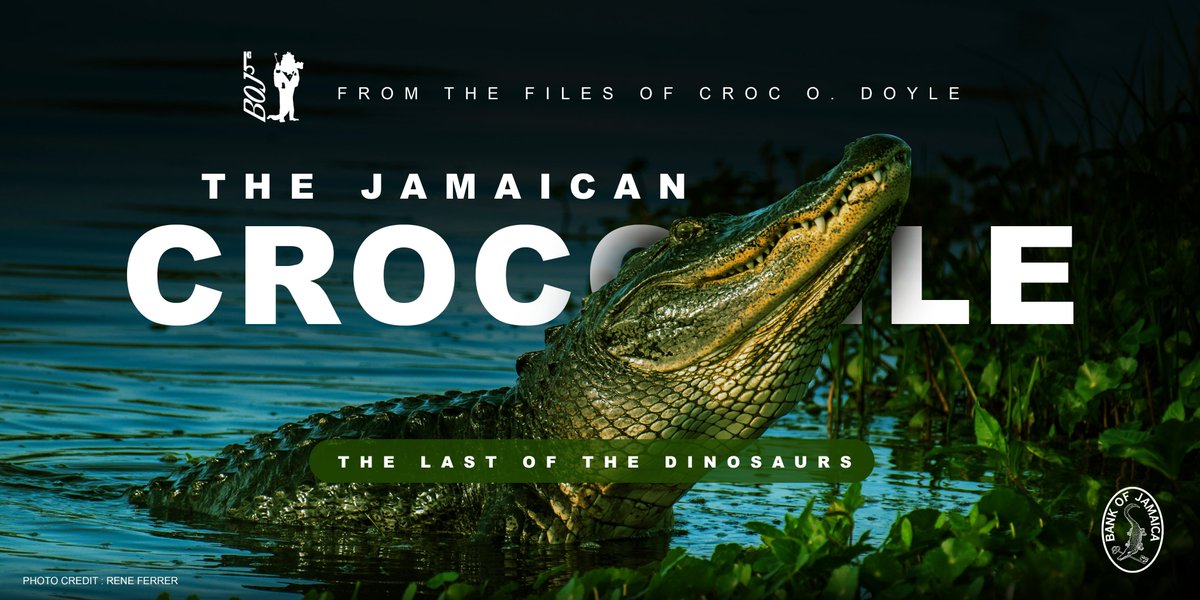 Regular Jamaican crocodiles do, however, enjoy special status in several ways. #BOJSpeaks https://abs.twimg.com/emoji/v2/... draggable="false" alt="🧵" title="Thread" aria-label="Emoji: Thread">" title="With crocodiles in the news of late, it& #39;s a good time to be reminded that while Agent Croc O. Doyle is a rare individual, office job and all, other crocodiles aren& #39;t as sophisticated. https://abs.twimg.com/emoji/v2/... draggable="false" alt="🤓" title="Nerd face" aria-label="Emoji: Nerd face"> Regular Jamaican crocodiles do, however, enjoy special status in several ways. #BOJSpeaks https://abs.twimg.com/emoji/v2/... draggable="false" alt="🧵" title="Thread" aria-label="Emoji: Thread">" class="img-responsive" style="max-width:100%;"/>
Regular Jamaican crocodiles do, however, enjoy special status in several ways. #BOJSpeaks https://abs.twimg.com/emoji/v2/... draggable="false" alt="🧵" title="Thread" aria-label="Emoji: Thread">" title="With crocodiles in the news of late, it& #39;s a good time to be reminded that while Agent Croc O. Doyle is a rare individual, office job and all, other crocodiles aren& #39;t as sophisticated. https://abs.twimg.com/emoji/v2/... draggable="false" alt="🤓" title="Nerd face" aria-label="Emoji: Nerd face"> Regular Jamaican crocodiles do, however, enjoy special status in several ways. #BOJSpeaks https://abs.twimg.com/emoji/v2/... draggable="false" alt="🧵" title="Thread" aria-label="Emoji: Thread">" class="img-responsive" style="max-width:100%;"/>
